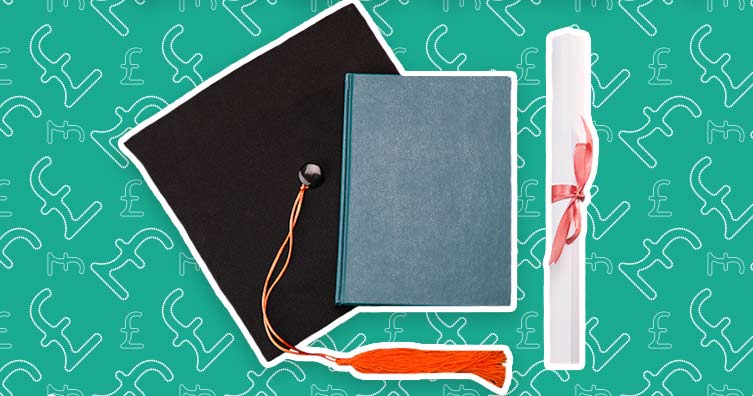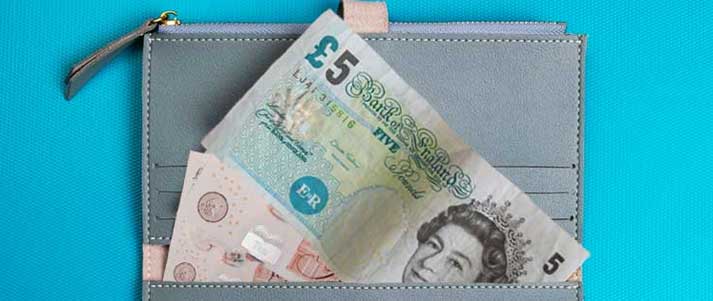PhD loans for doctoral students 2024
The government has recently introduced Student Loans for doctoral degrees to help you get a PhD without breaking the bank – but how do they work and how much can you get?

Credit: LightField Studios, Imichman – Shutterstock
Pursuing a doctoral degree but unsure what to expect from Student Finance? You've come to the right place.
The Postgraduate Doctoral Loan will help you fund both course fees and living costs over the duration of your studies. However, you'll have to pay it back and you'll be charged interest from day one.
Our complete guide has the lowdown on exactly how much you can get, how you'll receive it and when you need to pay it back.
What's in this guide?
Student Loans for postgraduate doctoral degrees
Although it's often referred to as the PhD loan, PhDs are just one type of doctoral degree eligible for the Doctoral Loan.
Here are some common postgraduate doctoral degrees that qualify for the Doctoral Loan:
- PhD/DPhil (Doctor of Philosophy)
- EdD (Doctor of Education)
- EngD (Doctor of Engineering).
Students typically study for a doctoral degree after first completing an undergraduate degree and then a postgraduate master's degree. The courses usually involve a student carrying out some independent research in a specific field of interest and producing a thesis.
Who is eligible for the Doctoral Loan?

You should be able to receive the Postgraduate Doctoral Loan if you're studying an eligible course and:
- You're under the age of 60
- You're a UK national, Irish citizen, have EU settled status or indefinite leave to remain
- You've lived in the UK, Channel Islands or the Isle of Man for at least three years in a row before the start of your course
- You normally live in England or Wales.
Doctoral Loan in Scotland and Northern Ireland
Currently, Doctoral Loans are not available to students from Scotland and Northern Ireland.
However, if you're from Scotland or Northern Ireland, there are other ways to fund your PhD.
For example, you can apply for a scholarship. The Carnegie Trust (for students in Scotland) and the Department for the Economy Postgraduate Studentship (for students in Northern Ireland) are great places to start.
Alternatively, see our guide on postgraduate funding for more ideas.
Reasons you might be ineligible for the Doctoral Loan
There are certain things that make you ineligible for the loan, so make sure to check these before you apply. If any of the following are applicable, you probably won't be able to receive the Doctoral Loan:
- You're already receiving funding from another source, such as Research Council Funding (e.g. studentships, stipends, scholarships), a Social Work Bursary or an NHS bursary (simply being eligible for an NHS Bursary makes you ineligible for the Doctoral Loan, even if you're not receiving it)
- You're already receiving Student Finance payments for another course you're studying
- You've received the Postgraduate Doctoral Loan before (excluding students who left their course due to illness, bereavement or other personal reasons)
- You already have a doctoral degree or equivalent (or a higher qualification)
- You're getting a doctorate by publication
- You're behind in repayments on your previous Student Loans (if you left the country and failed to keep up with your repayments, for example).
Eligible courses for the Doctoral Loan
Here are the criteria for postgraduate courses that are eligible for the Doctoral Loan:
- It must be a full, standalone doctoral course, not a top-up course
- You must have started your course on or after 1st August 2018
- It must last between three and eight academic years
- It must be at a UK university (with research degree awarding powers)
- It can be a full-time or part-time course
- It can be a taught or research-based course (or a combination of both)
- It can be a distance learning course, as long as you live in the UK while studying
- It can also be an integrated master's degree (a master's and PhD combined). However, you won't be able to apply for a separate Postgraduate Master's Loan.
If your course is spread across two universities (for example, through a collaborative research project) and one of these universities is not in the UK, you need to ensure the UK uni is the lead institution and that you study there for at least 50% of your course.
How much money can you get with a Doctoral Loan?

For students from England, here are the maximum amounts of loan you can get for the duration of your course, depending on when you start the doctoral degree:
- If your course starts on or after 1st August 2024, you can get up to £29,390
- For courses that started between 1st August 2023 and 31st July 2024, you can get up to £28,673
- For courses that started between 1st August 2022 and 31st July 2023, you can get up to £27,892.
And for students from Wales, here's how much you can get for the duration of your course, depending on when you start the doctoral degree:
- If your course starts on or after 1st August 2024, you can get up to £28,655
- For courses that started between 1st August 2023 and 31st July 2024, you can get up to £28,395
- For courses that started between 1st August 2022 and 31st July 2023, you can get up to £27,880.
This is not means-tested, meaning neither your income nor your parents' income is taken into consideration. Anyone can apply for the full loan, regardless of income.
Remember that receiving the loan might affect your eligibility for any other state benefits.
If you're looking for more ways to fund your PhD, head over to our guide to funding postgraduate degrees.
How is the Doctoral Loan paid?
One of the best things about the Doctoral Loan is that it's paid directly to you – unlike undergraduate Student Loans, where the money to cover your tuition fees goes straight to your uni.
This means you can decide how to use it, but it also means you'll have added things to consider in your monthly budget.
The Doctoral Loan needs to cover both your living expenses and course fees, so there's no point in splurging it and being unable to pay your university tuition.
However much you apply for will be divided equally across each year of your course. So, for instance, if you apply for the full £29,390 in England, you would receive around £7,347 each year on a four-year course.
You won't receive each instalment in a lump sum though. Instead, you'll receive it in three chunks across the year, 33%, 33% and 34%.
The first instalment won't arrive in your account until after your course start date, once your uni has confirmed that you've registered. You'll need to bear this in mind at the start of term, if you need to pay rent and a housing deposit, for example.
Doctoral Loan repayment

Credit: Yevgen Kravchenko, kamui29, Bell Photography 423 – Shutterstock
Repaying the Student Loan for your PhD works in essentially the same way as the Postgraduate Master's Loan.
These are the key points to remember about the Doctoral Loan repayment:
- You'll only start paying it back when you're earning over £21,000 a year (If you're not on a yearly salary, that's over £1,750 a month or £403 a week).
- Payments won't kick in until the April after you graduate, or the April four years after your course starts (if your course lasts longer than four years).
- You'll only repay 6% of what you earn over the £21,000 threshold.
- Your loan will start accumulating interest from the moment you receive your first instalment.
- Interest is usually worked out at RPI + 3%. This is usually updated every September using the RPI figure from March of the same year. However, in March 2023, RPI was 13.5% (meaning interest could have been up to 16.5% for some) which led the government to set a maximum of 7.9% for students and graduates in June 2024.
What happens if you already have a Student Loan?
You can still apply for a Postgraduate Doctoral Loan, even if you're still paying back your undergraduate Student Loan and/or your Postgraduate Master's Loan.
However, it can make it a bit harder to work out how much you'll pay back each month
Your undergraduate Student Loan is treated as a separate loan with different repayment conditions. On Plan 2, for example, you pay back 9% of anything you earn over £27,295.
Your Postgraduate Master's Loan is merged with your Postgraduate Doctoral Loan, meaning you'll make a combined repayment of 6% for both.
The table below shows monthly repayments for a Plan 2 undergraduate Student Loan and Postgraduate Loan (Master's and Doctoral combined) depending on your yearly salary.
| Yearly salary | Undergraduate Loan Repayment (Plan 2) | Postgraduate MA/Doctoral Loan Repayment | Total monthly repayment |
|---|---|---|---|
| £21,000 | £0 | £0 | £0 |
| £27,295 | £0 | £31 | £31 |
| £30,000 | £20 | £45 | £65 |
| £40,000 | £95 | £95 | £190 |
| £50,000 | £170 | £145 | £315 |
Should you borrow the maximum amount of Doctoral Loan?
If you're from England and your course starts on or after 1st August 2024, you can borrow up to £29,390 for the duration of your doctoral course. Or, if you're from Wales and you start your course on or after 1st August 2024, the maximum is £28,655.
But if you don't think you'll need that much, is it worth taking it all anyway?
Student Loans offer you a better deal than typical commercial loans. Although interest rates are quite high, you only pay back when you're able to and the monthly repayments are manageable (as they only increase as your salary increases).
Don't forget that the loan will be wiped after 30 years as well. If for whatever reason, you strongly believe you'll never pay off the full amount before it's written off, then this is technically free money and you should make the most of it.
However, the government maintains the right to change your Student Loan repayment terms (including things like interest rates and when the debt is written off), so please note that you could be stung if the terms change in the future.
How to apply for the Doctoral Loan

Credit: astarot – Shutterstock
You can apply for the Doctoral Loan online via Student Finance England or Student Finance Wales, where you can also download forms if you wish to apply by post instead.
For the academic year 2024/25, you can apply for the Doctoral Loan from summer 2024.
Unlike undergraduate Student Finance, you only need to apply once. You don't need to reapply every year, as you'll automatically receive the next instalment in your account when it's due.
Doctoral Student Loan deadline
The deadline for applying for the Doctoral Loan is nine months after the first day of the last academic year of your course.
The first day of the academic year depends on when your course starts. Use the table below to figure out the first day of your academic year:
| Course start date | Official first day of academic year |
|---|---|
| 1st August – 31st December | 1st September |
| 1st January – 31st March | 1st January |
| 1st April – 30th June | 1st April |
| 1st July – 31st July | 1st July |
So, if your course starts on 1st September 2024 and lasts three years, the deadline would be 31st May 2027.
Have you tried the best free software for students? Time to get your laptop in shape before the course begins...








